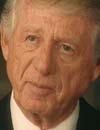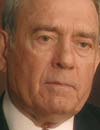- Tom Bettag
Former executive producer, Nightline, CBS Evening News - Ted Koppel
Former anchor, Nightline - Dan Rather
Former anchor, CBS Evening News
... You've been in this business for a very long time and in some very important positions with CBS and ABC. In your own mind, looking back over your long career, was there ever a golden age in TV?
Basically, I don't believe in the "good old days." One of the reasons why I'm an optimist was that I got into this because of [former CBS President] Fred Friendly at Columbia Journalism, and Friendly had been kicked in the teeth by CBS. [Edward R.] Murrow had been kicked in the teeth by CBS. They weren't the only ones who had experienced just awful, awful experiences in that. So I came into the business believing that this is a very tough business where you're trying to do news in an entertainment format and that there is an inherent conflict and there will always be a fight and always be a problem. I think Good Night, and Good Luck is a deeply pessimistic story. To say those are the good old days is not saying very much. ...
[Is there] anything that you look at and say, "We're actually much better at it now"?
Oh, there's no question that from a technological standpoint, we can bring you infinitely more. Again, golden days of Walter Cronkite, there used to be seven stories from Washington, two stories from outside, ... because Washington was the only place where you could get today's stories quickly on. Then there was a story that was phoned in from Vietnam. And then [correspondent] Ike Pappas was somehow coming in from a flood or a fire, and that was what it was. …
The American newsie who loves news has way more access to information than they ever had. You can't argue that the American public is much better served by a three-network oligopoly that only serves up what those three networks serve up as compared to what we have now. ... You have to dig, and you have to sort through some things that are either not accurate or junk, but there's nothing wrong with that. ...
[Were the 1960s] a golden age?
It was and it wasn't. It was in the sense that nobody really cared what news divisions did, and so we were all filled with a certain amount of hubris. We were the legitimate rationale for all of that crap that the rest of the network turned out. But the fact of the matter is also, most of what we did was pretty boring and not terribly well done. I'm speaking now most especially of ABC News, with which I'm most familiar.
If you go back, again to the early, mid-60s, what did we have? We had at ABC a 15-minute black-and-white evening newscast, and I think on Sunday mornings -- I'm not sure when it began, but certainly by the late '60s, early '70s -- we had Issues and Answers, which consisted primarily of an interviewer and whichever congressman or senator the then-producer of that program happened to meet at a cocktail party during the week in Washington. That was it. We didn't have anything else. I mean, that wasn't a particularly great news division. It became a great news division, but it became a great news division in the hands of a great producer, Roone Arledge. Roone Arledge knew that he had to cater not just to what the public ought to see but, to a certain degree, what the public wanted to see. And he, I think, maintained that balance pretty well. ...
... The legend of CBS ... is that [CBS founder Bill] Paley wanted the prestige of a news division, so he was willing to let them lose money and do good reporting, and if nothing else, it was a prestige factor. If you have more distant corporations, fewer ties to news divisions of companies owning and making decisions, doesn't that remove that incentive for them?
First of all, that legendary relationship between Bill Paley and his fellows in the news division is just that. Not in its entirety; everything you said was accurate to a point. But when, for example, the CBS affiliate in Birmingham, Ala., called Bill Paley and said, "Look, your boy Howard K. Smith has been saying that those little girls that were bombed in the church [in 1963] were bombed by the Klan, and some of our leading citizens here are members of the KKK, and if you don't do something about that, we're going to pull our CBS affiliation," guess where Bill Paley came down in those days? He didn't come down on the side of Howard K. Smith. He came down on the side of maintaining that affiliation. And as history will record, the legendary relationship between Bill Paley and Edward Murrow and [Murrow's producer and future CBS News President] Fred Friendly also went sour. And it went sour for very similar reasons: because he was feeling political and economic pressure, and as soon as he felt real economic pressure and real political pressure, guess what had to give?
Fred Friendly ended up leaving CBS News to go over to Columbia University, because he couldn't get Bill Paley to carry the hearings on the Vietnam War that the Senate Foreign Relations Committee or the Senate Armed Services Committee [were] carrying during the day. Basically the programming that would have been sacrificed would have been a second or third rerun of I Love Lucy. So I don't think that things have changed that much in that regard. It's always been about the money. ...
Let me take you back to when you got involved at CBS and met your colleagues in New York. What was your impression of CBS News?
Well, when I first came to CBS in early 1962, ... I thought I was a pretty good reporter with the arrogance or conceit of youth. I'd been paid as a reporter for well over 10 years, and yes, I thought I could write. But my first impression, which I remember, was just, "Wow."
One, I was walking the halls with legends: Charles Collingwood; Ed Murrow had just left -- I'd met Murrow in another circumstance; Eric Sevareid. The halls were filled literally with walking legends and already members of the Hall of Fame. Two, they could all write extremely well. One of my first impressions was, if I'm going to stay here in the big leagues, I'm going to have to learn to write a whole lot better.
But the central thing that impressed me was their spirit of mission. They saw their work -- their life's work -- as something bigger than themselves. ... To do quality news of integrity in the public service. ... And that permeated the halls of CBS News. You could smell it, see it, hear it, feel it. The strongest early reaction was, what a powerful sense of mission these people have.
They were journalists?
Oh, they were journalists. As a matter of fact, they didn't like to think of themselves as television people. Remember, this is 1962 when I first came to New York, and most of the people at CBS News had come out of a newspaper background and/or a radio background. ... But they didn't like to be described as television correspondents, or for that matter even radio correspondents. The word to use was "journalists." ...
![News War [site home page]](../art/p_title.gif)










